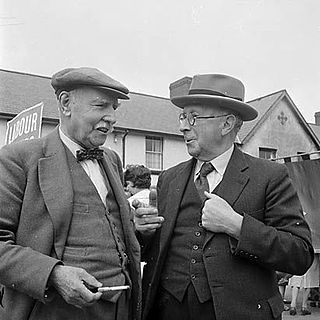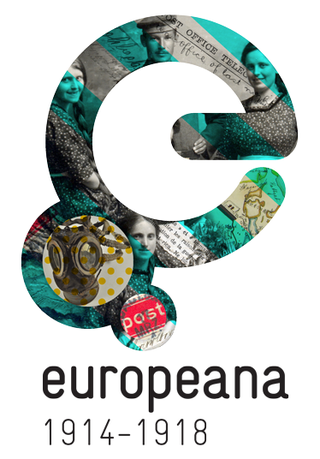
Hedd Wyn was a Welsh-language poet who was killed on the first day of the Battle of Passchendaele during World War I. He was posthumously awarded the bard's chair at the 1917 National Eisteddfod. Evans, who had been awarded several chairs for his poetry, was inspired to take the bardic name Hedd Wyn from the way sunlight penetrated the mist in the Meirionnydd valleys.
The Perseus Digital Library, formerly known as the Perseus Project, is a free-access digital library founded by Gregory Crane in 1987 and hosted by the Department of Classical Studies of Tufts University. One of the pioneers of digital libraries, its self-proclaimed mission is to make the full record of humanity available to everyone. While originally focused on the ancient Greco-Roman world, it has since diversified and offers materials in Arabic, Germanic, English Renaissance literature, 19th century American documents and Italian poetry in Latin, and has sprouted several child projects and international cooperation. The current version, Perseus 4.0, is also known as the Perseus Hopper, and is mirrored by the University of Chicago.

The National Library of Wales, in Aberystwyth, is the national legal deposit library of Wales and is one of the Welsh Government sponsored bodies. It is the biggest library in Wales, holding over 6.5 million books and periodicals, and the largest collections of archives, portraits, maps, and photographic images in Wales. The Library is also home to the national collection of Welsh manuscripts, the National Screen and Sound Archive of Wales, and the most comprehensive collection of paintings and topographical prints in Wales. As the primary research library and archive in Wales and one of the largest research libraries in the United Kingdom, the National Library is a member of Research Libraries UK (RLUK) and the Consortium of European Research Libraries (CERL).

Welsh Americans are an American ethnic group whose ancestry originates wholly or partly in Wales, United Kingdom. In the 2008 U.S. Census community survey, an estimated 1.98 million Americans had Welsh ancestry, 0.6% of the total U.S. population. This compares with a population of 3 million in Wales. However, 3.8% of Americans appear to bear a Welsh surname.
The Humanities Advanced Technology and Information Institute (HATII) was a research and teaching institute at the University of Glasgow in Scotland. It was established in 1997 with Professor Seamus Ross as Founding Director until 2009. HATII led research in archival and library science and in information/knowledge management. Research strengths were in the areas of humanities computing, digitisation, digital curation and preservation, and archives and records management.

Thomas Evan Nicholas, who used the bardic name Niclas y Glais, was a Welsh language poet, preacher, radical, and champion of the disadvantaged of society.

Europeana is a web portal created by the European Union containing digitised cultural heritage collections of more than 3,000 institutions across Europe. It includes records of over 50 million cultural and scientific artefacts, brought together on a single platform and presented in a variety of ways relevant to modern users. The prototype for Europeana was the European Digital Library Network (EDLnet), launched in 2008.
The Collections Trust is an independent UK-based charity that works with museums, libraries, galleries and archives worldwide to improve the management and use of collections. It was established in February 1977 as the Museum Documentation Association (MDA) and re-launched as the Collections Trust in 2008. Its head office is in Shoreditch, London.
The Archaeology Data Service (ADS) is an open access digital archive for archaeological research outputs. It is located in The King's Manor, at the University of York. Originally intended to curate digital outputs from archaeological researchers based in the UK's Higher Education sector, the ADS also holds archive material created under the auspices of national and local government as well as in the commercial archaeology sector. The ADS carries out research, most of which focuses on resource discovery, cross-searching and interoperability with other relevant archives in the UK, Europe and the United States of America.
Medwin Hughes was the Vice-Chancellor of the University of Wales Trinity Saint David and of the University of Wales from 2011 until August 2023. He was previously principal of Trinity University College, Carmarthen and Vice-Chancellor of the University of Wales, Lampeter.
The Welsh Group is an artists' collective, with the purpose of exhibiting and "giving a voice" to the visual arts in Wales.

Europeana 1914–1918 is a major project to digitise and publish primary and secondary historical sources on the First World War. It is coordinated by Europeana, as part of a broader program to digitise European cultural heritage.

Hugh Hughes (1790–1863) was a Welsh painter, engraver and writer.

Thomas Hughes Jones was a Welsh poet and writer from Ceredigion (Cardiganshire) in West Wales. He wrote several collections of stories and contributed to various journals, including Welsh Outlook, throughout his career. In 1940 he won the Literature Medal for his story, "Sgweier Hafila", at the National Eisteddfod. His pen name was generally abbreviated to "T. Hughes Jones".
1914-1918-online. International Encyclopedia of the First World War is an international, English-language online encyclopedia of the First World War. Deemed the largest research network of its kind, it officially went online on 8 October 2014. The editorial office is staffed by historians and uses Semantic MediaWiki.
David Hughes, known by his bardic name of Eos Iâl, was a Welsh poet and publisher. Hughes is known as the author of the plygain carol Ar Gyfer Heddiw'r Bore.
Rhiannon Ifans, FLSW is a Welsh academic specialising in English, Medieval and Welsh literature. She was an Anthony Dyson Fellow at the Centre for Advanced Welsh and Celtic Studies, in University of Wales Trinity St. David. She twice won a Tir na-n-Og prize for her work and won the literary medal competition at the Welsh Eisteddfod, for her 2019 debut novel, Ingrid, which was chosen for the Welsh Literature Exchange Bookshelf. In 2020, Ifans was elected as a Fellow of the Learned Society of Wales.

Wales, as part of the United Kingdom, participated as part of the allies in World War I (1914–1918) and the allies in World War II (1939–1945).
Eldra Mary Jarman born Eldra Mary Roberts had south Asian heritage as she was a Kale harpist and author. She is known for the books she researched on the Welsh Romani heritage and her knowledge of the triple harp. Her memoirs were made into a film.

The Centre for Advanced Welsh and Celtic Studies is a research institute located in Aberystwyth, Wales. The centre was established by the University of Wales in 1985, and works under the University of Wales Trinity Saint David.










